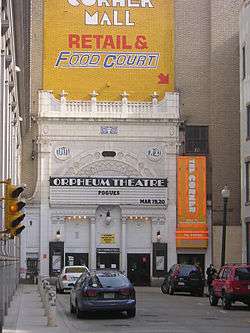Orpheum Theatre (Boston)
| Boston Music Hall, Empire Theatre, Aquarius | |
 | |
| Address |
1 Hamilton Place Boston, Massachusetts |
|---|---|
| Coordinates | 42°21′22.4″N 71°3′39″W / 42.356222°N 71.06083°WCoordinates: 42°21′22.4″N 71°3′39″W / 42.356222°N 71.06083°W |
| Owner | The Druker Company, Ltd. |
| Operator | Crossroads Presents |
| Type | Music venue |
| Capacity | 2,700 |
| Opened | 1852 |
| Website | |
|
www | |
The Orpheum Theatre is a music venue located at 1 Hamilton Place in Boston, Massachusetts. One of the oldest theaters in the United States, it was built in 1852 and was originally known as the Boston Music Hall, the original home of the Boston Symphony Orchestra. The concert hall was converted for use as a vaudeville theater in 1900. It was renamed the Orpheum Theatre in 1906. In 1915, the Orpheum was acquired by Loew's Theatres and substantially rebuilt. It operates as a mixed-use hall, primarily for live music concerts.
Note: The theater has no connection with Boston's "Music Hall", which is now known as the Citi Performing Arts Center.
History
When the Boston Symphony moved to Symphony Hall in 1900, the Boston Music Hall closed. It was converted, for use as a vaudeville theater, in 1900 and operated under a number of different names, including the Music Hall and the Empire Theatre. In 1906, it was renamed the Orpheum Theatre. In 1915, the theater was acquired by the Loew's Theatres. Loew's reopened the Orpheum in 1916 with a completely new interior designed by architect Thomas W. Lamb.
Operated by Loew's, the theater was at first a combination vaudeville and movie theater and later a straight first-run movie house. The Orpheum closed as a movie theatre on January 31, 1971 and reopened as the Aquarius, a live concert hall, on May 27, 1971. The first featured performer was James Brown. The new owner was an African-American business owner and activist named Arthur Scott.Newspaper articles of the time compared his new venture to the Apollo Theater in New York City.
From 1975 to 1979, the Orpheum served as the home of the Opera Company of Boston, under director Sarah Caldwell, until that company moved to the current Boston Opera House.
The Police recorded the first half of their Live! album, on November 27, 1979. U2's performance in 1983 was recorded and broadcast on The King Biscuit Flower Hour. In 1984, Aerosmith was united since Joe Perry and Brad Whitford left the band.[1] Tin Machine recorded a portion of their live album, entitled Tin Machine Live: Oy Vey, Baby, here on November 20, 1991.
Currently, the theater is owned by the Drucker Realty Company. The contract to operate the Orpheum was acquired by Don Law, a Boston concert promoter, from the Live Nation entertainment company, in 2009. Law announced a major renovation for the theater, after which it reopened in late 2009.[2] Live Nation retains a stake in the operations of Law's company, Crossroads Presents.[3][4][5]
The current entrance to the theater is the former alley entrance, replacing the original entrance on Washington Street,[6] which was converted into retail space.
See also
- Boston Music Hall, predecessor to the Orpheum (1852–1900)
Image gallery
 Beck ticket, 2002
Beck ticket, 2002 The Dresden Dolls, 2006
The Dresden Dolls, 2006 Interior, 2008
Interior, 2008 The Decemberists, 2008
The Decemberists, 2008
References
- ↑ "Orpheum Theatre in Boston, MA". Cinematreasures.org. Retrieved 2012-05-28.
- ↑ Goodison, Donna (May 6, 2009). "Live Nation sells halls". Boston Herald. Retrieved 2015-05-18.
- ↑ "Law to put his stamp on House of Blues - The Boston Globe". Boston.com. 2011-02-26. Retrieved 2015-05-18.
- ↑ "Live Nation selling Boston theaters - Boston Business Journal". Bizjournals.com. 2009-05-05. Retrieved 2015-05-18.
- ↑ "LIVE NATION ENTERTAINMENT, INC. : Annual Report 2012" (PDF). Phx.corporate-ir.net. Retrieved 2015-05-18.
- ↑ Verse Media. "About Orpheum Theatre - Boston Events, Boston Music, Boston Concerts". Crossroadspresents.com. Retrieved 2015-05-18.
External links
| Wikimedia Commons has media related to Orpheum Theatre (Boston, Massachusetts). |